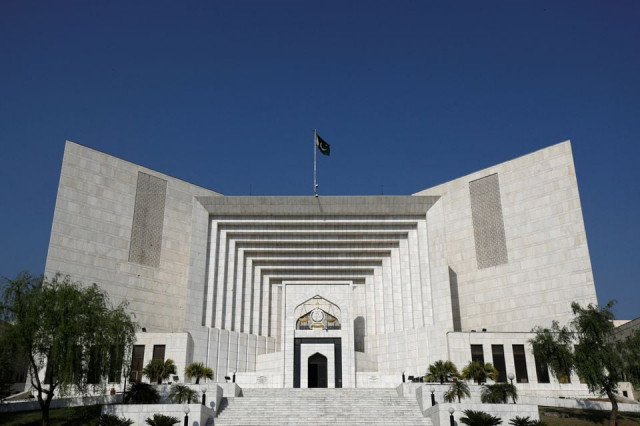Will top court swing into action again?
Some experts believe new law can help SC correct its error

President Dr Arif Alvi has surprised all, including the Supreme Court judges, by signing the Supreme Court (Review of Judgement and Orders) Bill 2023. The president signed the bill on Friday but neither he nor the federal government announced the development till Monday.
It was Attorney General for Pakistan (AGP) Mansoor Awan who revealed that the bill had been enacted to a three-judge bench led by Chief Justice of Pakistan Umar Ata Bandial hearing a review petition filed by the Election Commission of Pakistan (ECP) against the bench's April 4 order.
Some senior lawyers are also surprised by this development but they also welcome it.
The act says in case of judgments and orders of the Supreme Court in exercise of its original jurisdiction under Article 184 of Constitution, scope of review on both facts and law, shall be the same as an appeal under Article 185 of the Constitution.
These lawyers believe that this legislation will provide a chance to the SC to correct its errors in high profile cases. Unlike the Supreme Court (Practice and Procedure) Act, 2023, the SC could not make a preemptive move to suspend the law.
However, this matter can be raised before a larger bench on Thursday.
The main consequence of this legislation is that the three-judge bench that was hearing the ECP review petition adjourned hearing of the case for an indefinite period. A senior lawyer believes that this new legislation will also give face-saving to this bench which has failed to implement its April 4 order.
Earlier, the scope of review was limited under the Supreme Court Rules 1980. Even the SC's jurisprudence, evolved through its judgments, endorsed the limited scope of review.
Though the government said new legislation will not be beneficial for former prime minister Nawaz Sharif and Pakistan Tehreek-e-Insaf (PTI) disgruntled leader Jahangir Tareen, it will certainly give a chance to both the leaders to end their lifetime disqualification.
The review petitions filed by Nawaz and Tareen against their disqualification under Article 62 (1) (f) of constitution have already been rejected.
Read ECP review petition: SC adjourns hearing indefinitely after AGP informs of new law
A five-judge larger bench led by former CJP Saqib Nisar had held that the disqualification of lawmakers under Article 62 (1) (f) of the Constitution is for lifetime. The review petition against that ruling had been turned down.
Under section 5 of the new law, both the leaders can now file review petitions against that judgment within 60 days of the commencement of this act.
A senior government official admitted that the new law will benefit both Nawaz and Tareen. However, he said, the CJP is still relevant while there exists a complete mistrust between him and the government.
It is learnt that both the leaders will file review petitions against former CJP Nisar's ruling. If the mistrust persists then they will move a review one day before expiry of the 60-day deadline. CJP Bandial is retiring in the month of September while summer vacations are going to start from June 12.
This act will also apply to the Supreme Court Bar Association's (SCBA) review petition against a majority judgment which held that votes of defecting lawmakers would not be counted under Article 63-A.
Under section 3 of the new law, the review petition shall be heard by a larger bench than the bench which passed the original judgment in jurisdiction of Article 184 (3) of the Constitution.
The SC in its judgements also endorsed the SC rules that said the same bench will hear the review petition. The new law does not say that other judges will hear the review petition.
Some senior lawyers wondered as to why the government on the one hand gives right of appeal against judgements passed under Article 184 (3) of the Constitution but on the other hand enlarges the scope of review against the decisions taken under jurisdiction of public interest.
The SC will raise questions on this point during the hearing.
An eight-judge larger bench has suspended the SC (Practice and Procedure) Act 2023.
There is still a debate about whether the government can file a review petition against that interim order. A senior lawyer said no reference of “interim order” has been made in the new law.
Superior bars had been continuously urging the SC to review the SC Rules 1980. Despite their request, a full court of the SC did not decide this matter.
A full court has not convened for more than two years and therefore, the parliament has done the right thing, some lawyers said, by giving the right of fair trial and due process to citizens.
Ideally, such legislation should be carried out after getting input from the judiciary. However, the relationship between the parliament and Supreme Court is not cordial right now.
The ball is now in the judiciary’s court. Now the Supreme Court will decide the fate of the pieces of legislation which aim at regulating its jurisdiction.



















COMMENTS
Comments are moderated and generally will be posted if they are on-topic and not abusive.
For more information, please see our Comments FAQ